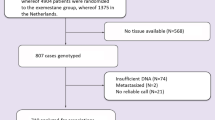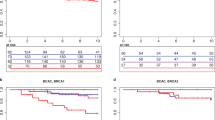Abstract
In patients with breast cancer (BC), deregulation of estrogen receptor (ERα) activity may account for most resistance to endocrine therapies. Our previous study used a whole-human kinome siRNA screen to identify functional actors in ERα modulation and showed the implication of proteins kinase suppressors of ras (KSR1). From those findings we evaluated the clinical impact of KSR1 variants in patients with ERα+ BC treated with TAM. DNA was obtained from 222 patients with advanced ERα+ BC treated with TAM who had undergone surgery from 1981 to 2003. We selected three potentially functional relevant KSR1 polymorphisms; two within the 3’UTR (rs224190, rs1075952) and one in the coding exon 7 (rs2293180). The primary end points were overall survival (OS) and disease-free survival (DFS). After a 6.4-year median follow-up, patients carrying the rs2241906 TT genotype showed shorter DFS (2.1 vs 7.1 years, P=0.005) and OS (2.6 vs 8.4 years P=0.002) than those with the TC or TT genotypes. Those associations remained significant in the multivariable analysis adjusting age, lymph node status, LMTK3 and IGFR variants and HER2 status. The polymorphisms rs2241906 and rs1075952 were in linkage disequilibrium. No association was shown between rs2293180 and survival. Among the actors of ERα signaling, KSR1 rs2241906 variants may predict survival in patients with advanced ERα+ BC treated with adjuvant TAM.
This is a preview of subscription content, access via your institution
Access options
Subscribe to this journal
Receive 6 print issues and online access
$259.00 per year
only $43.17 per issue
Buy this article
- Purchase on Springer Link
- Instant access to full article PDF
Prices may be subject to local taxes which are calculated during checkout


Similar content being viewed by others
References
Siegel R, Ma J, Zou Z, Jemal A . Cancer statistics, 2014. Cancer J Clin 2014; 64: 9–29.
Hammond ME, Hayes DF, Dowsett M, Allred DC, Hagerty KL, Badve S et al. American Society of Clinical Oncology/College Of American Pathologists guideline recommendations for immunohistochemical testing of estrogen and progesterone receptors in breast cancer. J Clin Oncol 2010; 28: 2784–2795.
Jiang J, Sarwar N, Peston D, Kulinskaya E, Shousha S, Coombes RC et al. Phosphorylation of estrogen receptor-alpha at Ser167 is indicative of longer disease-free and overall survival in breast cancer patients. Clin Cancer Res 2007; 13: 5769–5776.
McGlynn LM, Tovey S, Bartlett JM, Doughty J, Cooke TG, Edwards J . Interactions between MAP kinase and estrogens receptor in human breast cancer. Eur J Cancer 2013; 49: 1176–1186.
Ali S, Coombes RC . Endocrine-responsive breast cancer and strategies for combating resistance. Nat Rev Cancer 2002; 2: 101–112.
Davies C, Godwin J, Gray R, Clarke M, Cutter D, Darby S et al. Relevance of breast cancer hormone receptors and other factors to the efficacy of adjuvant tamoxifen: patient-level meta-analysis of randomised trials. Lancet 2011; 378: 771–784.
Burstein HJ, Prestrud AA, Seidenfeld J, Anderson H, Buchholz TA, Davidson NE et al. American Society of Clinical Oncology clinical practice guideline: update on adjuvant endocrine therapy for women with hormone receptor-positive breast cancer. J Clin Oncol 2010; 28: 3784–3796.
Moerkens M, Zhang Y, Wester L, van de Water B, Meerman JH . Epidermal growth factor receptor signalling in human breast cancer cells operates parallel to estrogen receptor alpha signalling and results in tamoxifen insensitive proliferation. BMC Cancer 2014; 14: 283.
Osborne CK, Schiff R . Mechanisms of endocrine resistance in breast cancer. Annu Rev Med 2011; 62: 233–247.
Giamas G, Filipović A, Jacob J, Messier W, Zhang H, Yang D et al. Kinome screening for regulators of the estrogen receptor identifies LMTK3 as a new therapeutic target in breast cancer. Nat Med 2011; 17: 715–719.
Goettel JA, Liang D, Hilliard VC, Edelblum KL, Broadus MR, Gould KL et al. KSR1 is a functional protein kinase capable of serine autophosphorylation and direct phosphorylation of MEK1. Exp Cell Res 2011; 317: 452–463.
Fisher KW, Das B, Kortum RL, Chaika OV, Lewis RE . Kinase suppressor of ras 1 (KSR1) regulates PGC1α and estrogen-related receptor α to promote oncogenic Ras-dependent anchorage-independent growth. Mol Cell Biol 2011; 31: 2453–2461.
Zhang H, Xu Y, Filipovic A, Lit LC, Koo CY, Stebbing J et al. SILAC-based phosphoproteomics reveals an inhibitory role of KSR1 in p53 transcriptional activity via modulation of DBC1. Br J Cancer 2013; 109: 2675–2684.
Gramling MW, Eischen CM . Suppression of Ras/Mapk pathway signaling inhibits Myc-induced lymphomagenesis. Cell Death Differ 2012; 19: 1220–1227.
Zhang J, Zafrullah M, Yang X, Yin X, Zhang Z, Fuks Z et al. Downregulation of KSR1 in pancreatic cancer xenografts by antisense oligonucleotide correlates with tumor drug uptake. Cancer Biol Ther 2008; 7: 1490–1495.
Llobet D, Eritja N, Domingo M, Bergada L, Mirantes C, Santacana M et al. KSR1 is overexpressed in endometrial carcinoma and regulates proliferation and TRAIL-induced apoptosis by modulating FLIP levels. Am J Pathol 2011; 178: 1529–1543.
Li B, Lu L, Zhong M, Tan XX, Liu CY, Guo Y et al. Terbinafine inhibits KSR1 and suppresses Raf-MEK-ERK signaling in oral squamous cell carcinoma cells. Neoplasma 2013; 60: 406–412.
Winder T, Giamas G, Wilson PM, Zhang W, Yang D, Bohanes P et al. Insulin-like growth factor receptor polymorphism defines clinical outcome in estrogen receptor-positive breast cancer patients treated with tamoxifen. Pharmacogenomics J 2014; 14: 28–34.
Conne B, Stutz A, Vassalli JD . The 3' untranslated region of messenger RNA. Nat Med 2000; 6: 637–641.
Conneely KN, Boehnke M . So many correlated tests, so little time! Rapid adjustment of P values for multiple correlated tests. Am J Hum Genet 2007; 81: 1158–1168.
Lozano J, Xing R, Cai Z, Jensen HL, Trempus C, Mark W et al. Deficiency of kinase suppressor of Ras1 prevents oncogenic ras signaling in mice. Cancer Res 2003; 63: 4232–4238.
Stebbing J, Zhang H, Xu Y, Lit LC, Green AR, Grothey A . KSR1 regulates BRCA1 degradation and inhibits breast cancer growth. Oncogene advance online publication, 9 June 2014; doi:10.1038/onc.2014.129 (e-pub ahead of print).
Kim M, Yan Y, Kortum RL, Stoeger SM, Sgagias MK, Lee K et al. Expression of kinase suppressor of Ras1 enhances cisplatin-induced extracellular signal-regulated kinase activation and cisplatin sensitivity. Cancer Res 2005; 65: 3986–3992.
Stoeger SM, Cowan KH . Characterization of kinase suppressor of Ras-1 expression and anticancer drug sensitivity in human cancer cell lines. Cancer Chemother Pharmacol 2009; 63: 807–818.
Goldhirsch A, Ingle JN, Gelber RD, Coates AS, Thürlimann B, Senn HJ . Panel members SO Thresholds for therapies: highlights of the St Gallen International Expert Consensus on the primary therapy of early breast cancer 2009. Ann Oncol 2009; 20: 1319.
Baselga J . Herceptin alone or in combination with chemotherapy in the treatment of HER2-positive metastatic breast cancer: pivotal trials'. Oncology 2001; 61: 14–21.
Gelmon KA, Boyle F, Kaufman B, Huntsman D, Manikhas A, Di Leo A et al. Open-label phase III randomized controlled trial comparing taxane-based chemotherapy (Tax) with lapatinib (L) or trastuzumab (T) as first-line therapy for women with HER2+ metastatic breast cancer: Interim analysis (IA) of NCIC CTG MA.31/GSK EGF 108919. ASCO Annual Meeting 2012.
Carey LA, Rugo HS, Marcom PK, Mayer EL, Esteva FJ, Ma CX et al. TBCRC 001: randomized phase II study of cetuximab in combination with carboplatin in stage IV triple-negative breast cancer. J Clin Oncol 2012; 30: 2615–2623.
Baselga J, Gómez P, Greil R, Braga S, Climent MA, Wardley AM et al. Randomized phase II study of the anti-epidermal growth factor receptor monoclonal antibody cetuximab with cisplatin versus cisplatin alone in patients with metastatic triple-negative breast cancer. J Clin Oncol 2013; 31: 2586–2592.
Davies C, Pan H, Godwin J, Gray R, Arriagada R, Raina V et al. Long-term effects of continuing adjuvant tamoxifen to 10 years versus stopping at 5 years after diagnosis of oestrogen receptor-positive breast cancer: ATLAS, a randomised trial. Lancet 2013; 381: 805–816.
Author information
Authors and Affiliations
Corresponding author
Ethics declarations
Competing interests
The authors declare no conflict of interest.
PowerPoint slides
Rights and permissions
About this article
Cite this article
Benhaim, L., Zhang, W., Wakatsuki, T. et al. Genetic variants of kinase suppressors of Ras (KSR1) to predict survival in patients with ERα-positive advanced breast cancer. Pharmacogenomics J 15, 235–240 (2015). https://doi.org/10.1038/tpj.2014.58
Received:
Revised:
Accepted:
Published:
Issue Date:
DOI: https://doi.org/10.1038/tpj.2014.58



